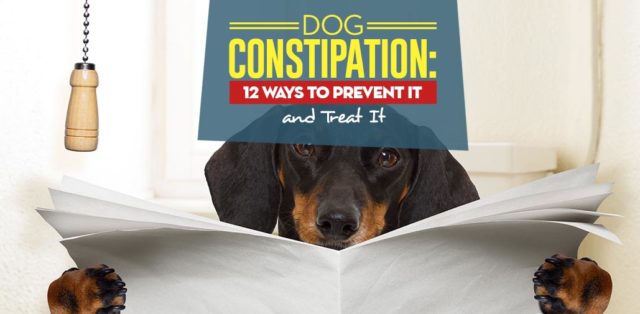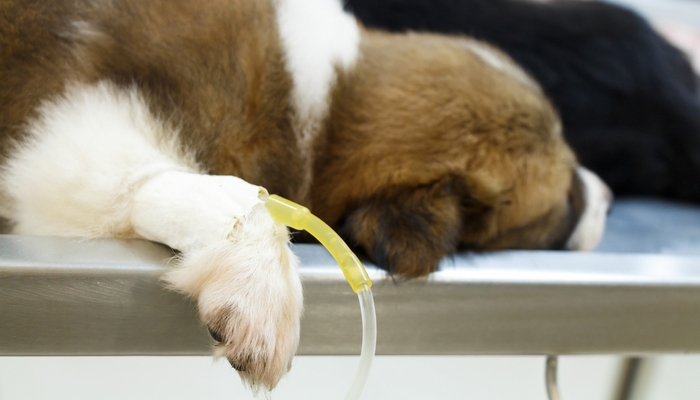
Table of Contents
Constipation in dogs may not be as common as diarrhea, but it still happens quite often in growing canines.
As a result, it's essential to talk about it and be aware of the symptoms.
Still, dog constipation is too often ignored by pet owners.
If left untreated, the condition could run its course independently and cause serious injury to your pup.
While constipation in dogs can be a temporary condition and can pass on its own relatively quickly, dog constipation can come from significant health issues.
In turn, this condition could lead to even bigger life-threatening conditions.
Dog Constipation
12 ways to prevent and treat it
Causes of Dog Constipation
There are a lot of different possible causes for dog constipation.
Before we go over the main ones, however, we can also summarize them into three distinct categories:
Interluminal causes – This group involves the partial or complete blockage of the colon, usually by indigestible matter.
Extraluminal causes – This is a much more life-threatening group.
These happen outside the colon and could include a narrowed pelvis from a pelvis fracture or a growing tumor that presses on the colon.
Intrinsic causes – This term is used for a group of neuromuscular causes.
These can be anything from nerve injury to various diseases, which I will discuss in a minute.
However, to give you some specific examples, let's talk about the most common causes and what they may mean.
The most common cause of dog constipation is swallowing indigestible objects or things that are relatively hard to digest.
A prime example of that is pieces of dry bones.
This is why most veterinarians advise you against giving your dog bones and tell you to swap them with a nylon chew toy instead.
Other such examples can be pieces of cloth, toys, rocks, etc.
This is why paying attention to what your dog eats and chews on is always important.
Similar to the above, ingested hair from self-grooming can also cause constipation.
And while you should obviously let your dog take care of his own hygiene, if he's a long-haired breed, it's always important to brush him regularly yourself.
You'd be a great help, the dog will appreciate it, and you'll prevent this cause of constipation.
RELATED: How To Stop Dogs From Shedding 101 – A Step-by-Step Guide
While talking about eating and digesting foreign things, many human foods, including meat-based appetizers, can cause dog constipation.
This is one of the many reasons you should never let your dog eat human food; instead, stick to dog food and dog treats.
Dehydration is another of the more common causes of constipation.
While it may seem like an easy problem to fix, dehydration can also cause a lot of other health problems.
That's why you need to address it as quickly as possible.
Other common causes of dog constipation include:
- blocked or abscessed anal sacks
- enlarged prostate
- kidney disease.
- tumors or other masses in the pelvis and around the anus
- increased stress
- a side effect of a medication, supplements, or surgery
- insufficient fiber in the dog's diet
- insufficient exercise
Signs of Dog Constipation
Now that we've got some of you a bit scared, let's take a look at some of the key symptoms of dog constipation.
While constipation can easily pass on its own, just as it often does in humans, if a day or two has passed and the symptoms persist, immediately seek a veterinarian's help.
The first and most apparent sign of dog constipation is a complete lack of defecation.
Especially if you've trained your dog well (which you should!) and he always defecates at specific, regular intervals, the sudden lack of defecation should be easy to spot.
However, not defecating once can be a minor thing that passes on its own.
But if your dog continues not to defecate (even just for a second consecutive day), you'd be right to worry.
General difficulties when defecating are another easy-to-spot sign.
For example, even if the dog manages to defecate in the end, he/she is doing it slower than usual.
Or if he/she is straining, crouching, or whimpering while trying to defecate, that's usually a surefire way to determine constipation.
Other signs of dog constipation include:
- small, hard, dry feces
- a small amount of mucus discharge while trying to defecate without any actual release of feces
- redness, swelling, or pain around the anus
- scooting (the action of rubbing the anus on the ground or carpeting)
- abdominal bloating
RECOMMENDED: Dog Has Diarrhea? 9 Ways to Prevent and Treat It
Dog Constipation Treatments
There are a lot of things that can and should be done when your dog has constipation.
Almost all of them start with “go to the vet.”
And, while most people read educational articles such as this one in the hopes of avoiding a visit to the vet, the fact remains that dog constipation is an internal issue.
It usually isn't severe, but in some cases, it can have many life-threatening causes and consequences.
So, whatever you want and think about doing, always get your dog to a good veterinarian you know and trust.
Now, with that out of the way, let's go over the main ways to treat and prevent dog constipation.
Some of those will be directly prescribed to you by your vet, and others you can and should do yourself.
Immediate Care
Several things should always be done before taking your dog to the vet or while on the way there.
These are not dietary actions, as those will come later.
If you have seen a thread or a string hanging from your dog's anus, DO NOT pull it.
You don't know what's on the other end of that string, and there's a significant risk of causing severe internal damage if you pull it.
However, if you see grass in the anus of your dog, it should be safe to pull it out gently.
It's doubtful that there's anything significant at the other end of the grass.
If there are feces matted around the anus of the dog, carefully trim them with scissors.
If your dog is long-haired, it's strongly advised to soak their behind in warm water first.
Dogs can be very frantic when their anus hair is being trimmed, especially if you're pulling on the hair due to being stuck in feces.
Whether you'll be trimming your dog's anal hair or not, it's usually a good idea to wash the anal region with warm, soapy water. You should also apply some soft jelly on the inflamed area afterward.
Take the dog's temperature.
Regardless of constipation, an abnormally high temperature should tell you that a quick visit to the vet is a must.
If the thermometer is bloodied, even more so.
You can watch the informative video below for more information on taking a dog's temperature with a thermometer.
Veterinary Care
What are some of the things that you can expect your veterinarian to do when you bring them a constipated dog?
This section is not here so that you can try to tell vets how to do their job but simply so that you can know what to expect.
First comes the diagnosis.
Dog constipation may be the condition for which you are bringing your dog to the vet.
Still, several tests can be done to determine the underlying cause of that constipation.
Some of them include radiographs, abdominal ultrasounds, and blood work.
Any subsequent actions of your vet will be based on these tests’ results.
Next come the treatments.
Depending on the health problem your dog is experiencing, there are many things your vet can decide to do.
The dog can be hospitalized and given enemas to remove or pass the obstructions in his colon.
The dog can also be hospitalized for further prolonged examinations if the vet deems it necessary.
The vet can also administer fluids under the skin to ensure your pet is properly hydrated.
Intravenously administered fluids are also something you can expect.
In the case of male dogs where the prostate is causing constipation, an immediate castration is usually done.
If some of these treatments sound frightening (like immediate castration), remember that they are never administered without reason – your vet knows what he or she is doing.
RELATED: What Are the Best Probiotics For Dogs and Do Our Pets Need Them?
Constipation In Dogs Home Remedies and Treatments: 12 Cures
S
o, once the visit to the vet has come and passed, what are the things you can do at home to treat dog constipation?
Your veterinarian may even recommend some of these treatments.
There are a lot of known remedies that can prevent constipation, as well as treat it.
Most of those shouldn't be administered without a vet consultation, but you should also be aware of them to know what to ask for.
Pumpkin
To start with natural ingredients that you can add to your dog's diet, a pureed fresh pumpkin or even some canned pumpkin can be a great addition to your dog's food.
Pumpkin is very high in water content and is one of the best sources of fiber.
If you're wondering how to add pumpkin to your dog's food, there are a lot of great recipes online.
We've featured some pumpkin recipes here on Top Dog Tips. Some of them include the following:
- Pumpkin Peanut Butter Homemade Dog Treats
- Healthy Pumpkin Cookie Dog Treat Recipe
- Pumpkin Dog Treats for Sensitive Stomachs
- Dog Treats with Sweet Potato and Pumpkin
- Dog Treat Recipe with Pumpkin Seeds and Cranberries
Bran (wheat or oat)
Similarly to pumpkin, bran is very rich in fiber.
It isn't rich in water, so ensure your dog is well-hydrated.
Also, even though it's just food, consult your vet about how much of it you should add to your dog's food.
Organic apple cider vinegar or aloe juice
Both are great ways to improve digestion and treat or prevent constipation.
Consult your vet on the appropriate dosage, but aim for one-fourth of a tablespoon per 10 pounds of body weight.
Add the vinegar or juice to your dog's food once or twice daily.
Chiropractic, acupuncture, and massages
These three techniques can help with chronic dog constipation, but never try administering them yourself.
Trust your vet to tell you whether or not they are appropriate and to apply them.
Food supplements, digestive enzymes and probiotics
There are a lot of different food supplements out there that are great for constipation.
Many typically contain acidophilus, folic acid, and vegetable enzymes.
And, of course, make sure to consult with your veterinarian first.
MORE INFORMATION: Top 5 Best Digestive Enzymes for Dogs
Aloe Ferox
Speaking of food supplements, you can also try Aloe Ferox.
It has a strong beneficial effect as a natural remedy and cleanser. Use only after a vet's approval.
Mineral oil
A simple way to help lubricate the stool, mineral oils are often vital in curing constipation.
Milk of Magnesia
Another thing that you shouldn't give your dog without your vet's approval.
Milk of Magnesia can also cure constipation pretty much by itself.
Powdered psyllium seeds
A great way to pull water into the stool and ease its transition through the colon, psyllium seeds may be what your dog needs.
Laxatives
Good old laxatives can, of course, also do the trick if your vet advises it.
Enema
We mentioned it above, but it's also worth mentioning here since some dog owners take it upon themselves to do it.
Always consult your vet first and ensure you know what you are doing.
Otherwise, an enema is a great way to treat constipation.
Increased exercise
We are putting this last on the list, not because it's the last thing you should consider, but because we want you to remember it.
Insufficient exercise is one of the most ignored reasons for dog constipation, as well as for a ton of other health problems in dogs.
So, similarly, it's one of the best ways to treat and prevent constipation in the future.
Not to mention that it's also one of the best ways to make your dog infinitely happier.
In other words, get your dog to the park!
FAQs on Constipation in Dogs
Can bully sticks cause constipation?
Yes, they can. You need to watch your dog when you give them a bully stick. And don't let them chew on it for hours because they could swallow large portions without chewing.
In that case it's become an emergency because your dog is at risk for intestinal blockage.
Is milk a laxative for dogs?
Yes, it is an option as a laxative. However, milk should not be consumed daily. It is not a normal part of their diet.
Dog Constipation Guide: Summary
So, hopefully, we've covered everything you need to know about constipation in dogs.
You'll be able to spot the signs of dog constipation and address it quickly.
We also talked about what makes a dog constipated so you can prevent it from happening in the future.
Again, either way, if your dog is constipated, we recommend not trying to figure it out yourself.
Talking to a vet or calling the vet office to look at them may be the most expensive, but it's the fastest way to treat constipation in dogs.
READ NEXT: 15 Dog Poop Facts You Don't Want To Be Reading About
Want to share this?



















